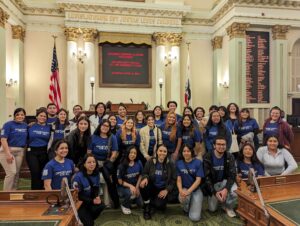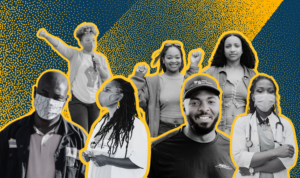Q&A with Saba Waheed
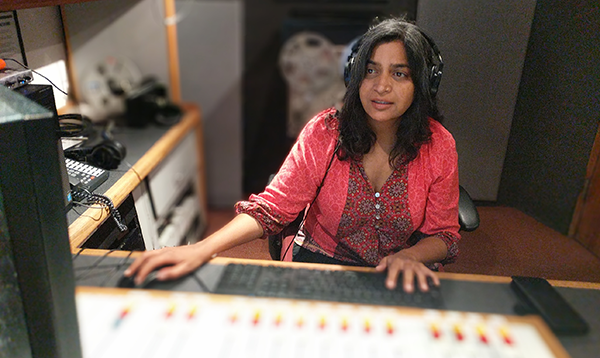
Many of you know Saba as the Research Director at the UCLA Labor Center, but did you know she is also the co-founder of Re:Work Radio — our podcast that spotlights the voices of workers, immigrants, and people of color? While Saba is usually the one asking the questions, we decided to flip things and interview her to learn more about the woman behind the mic.
What sparked the birth of Re:Work Radio?
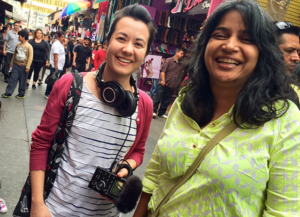 Henry Walton hosted a show called Labor Review for over nineteen years on KPFK. He wanted to retire, and about seven years ago he asked if Stefanie Ritoper, our Director of Communications at that time, and I would take it over.
Henry Walton hosted a show called Labor Review for over nineteen years on KPFK. He wanted to retire, and about seven years ago he asked if Stefanie Ritoper, our Director of Communications at that time, and I would take it over.
My first love has always been literature, so for me radio was a great way to take that passion and bring it into work. Stefanie and I decided to take up Henry’s offer, but to switch the format from Q&A style to understanding issues through people’s stories. That’s how Re:Work Radio started. It was more in the spirit of storytelling and what it means to center the conditions of work by learning about a person’s life.
You mentioned you love literature. We heard you are also a writer. Tell us more.
Ever since I was a kid, books were a way to travel, meet people I wouldn’t get to meet otherwise, and learn about things I couldn’t necessarily access. On a Saturday, I could easily be reading for twelve hours, just laying on my bed with a book. As a child, I thought I was going to be an English teacher.
I now write short stories that are inspired by things that I learn from work or the people I meet. For instance, I’ll have a story about a friendship, but then suddenly there will be a labor component to it. It’s similar to the Re:Work Radio model in that it’s not about hammering the issue on your head, but really having you get invested and attached to the person, so that it humanizes their experience. You can see the labor and you can see the work in a way that you didn’t before. I am working on creating a short story collection, writing a couple of short stories each year.
Can you tell us more about your life growing up?
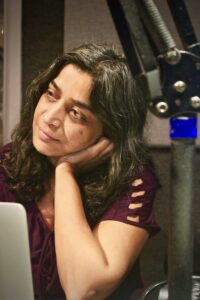
In my family, they had traditional roles. It was assumed that a girl should live at home during college, so when I got into UC Berkeley, which was not local, it was a big challenge for my parents to let me go. There were a lot of roles I was expected to stay in, but I kept pushing against them. I am grateful that my parents finally loosened up and realized that education was most important to me.
How did you get into research?
I had been studying anthropology at the graduate level and wanted to focus on the Muslim community and critique some fundamentalist elements in the diaspora. However, I was in New York when 9/11 happened, and all of a sudden, the narrative on Muslims completely changed. There were a lot of hate crimes and targeting of anyone who “looked Muslim.” I realized that offering some kind of critique of the religion would be a platform to start a xenophobic war.
I decided not to do the project and instead started working part time as a researcher at a legal organization. I surveyed taxi drivers, and the research helped achieve the first fair increase for taxi drivers in ten years. This experience made me realize that there was another way of doing research: having communities tell their own stories and advocate for themselves using statistical data to support their campaigns.
What does research mean to you?
All these years of doing research has been about empowering communities to tell their own stories in a data-driven way. This includes developing curriculum, training, and tools, so people can do their own research. Although this feels different from being a writer, it’s still about us telling our own stories. Re:Work Radio fits right into the same model of people telling their stories to raise awareness, talk about issues, and get others to think about things differently.
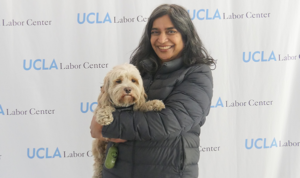
Do you have any other hobbies?
I am still an avid reader. I have two book clubs. I read a couple of books each month, and I love going to book talks. I also have a puppy who I am a very big fan of. We go for hikes and long walks. Walking is one of my absolute favorite things to do. I’ve also started a meditation practice that keeps me grounded, and I spend a lot of time with my family.
Can you share more about your meditation practice?
My friend Stefanie introduced me to meditation. We did a style where we sit still and your eyes are open and you can’t move. You have to be in your head a lot when you’re doing research and writing, so it was such a challenge for my head to not be able to move, and it was just me, my thoughts, and stillness. When the time was up, I felt this giant buzz. Your mind gets a little quieter, and you get more into your body.
So now I meditate almost everyday. There is a community of social justice-minded folks, and when the world gets more chaotic, we’ll sit together as a way to strengthen ourselves. It’s not just personal self-care for me — we are trying to build some power with each other when we are sitting together, so we can go out and keep doing the work that is needed.
What advice would you give your younger self?
It wouldn’t be advice, but I would thank my younger self for being open to taking paths not expected. I remember thinking I knew exactly what I was going to do. For me, being in New York during 9/11 was such a painful and scary time, and that challenge basically opened up what was going to become my path. I am grateful for letting myself let go, change tracks, take risks, and jump.
How do you see Re:Work Radio ten years from now?
We will continue to look for stories that need to be centered. I imagine as the world changes, the types of stories will evolve, and we will evolve along with it. I hope the stories develop and transform to showcase the progress of Re:Work Radio. As a show, it will be interesting to see if we can do a series or a story that can be done in multiple episodes as a way of going deeper.
